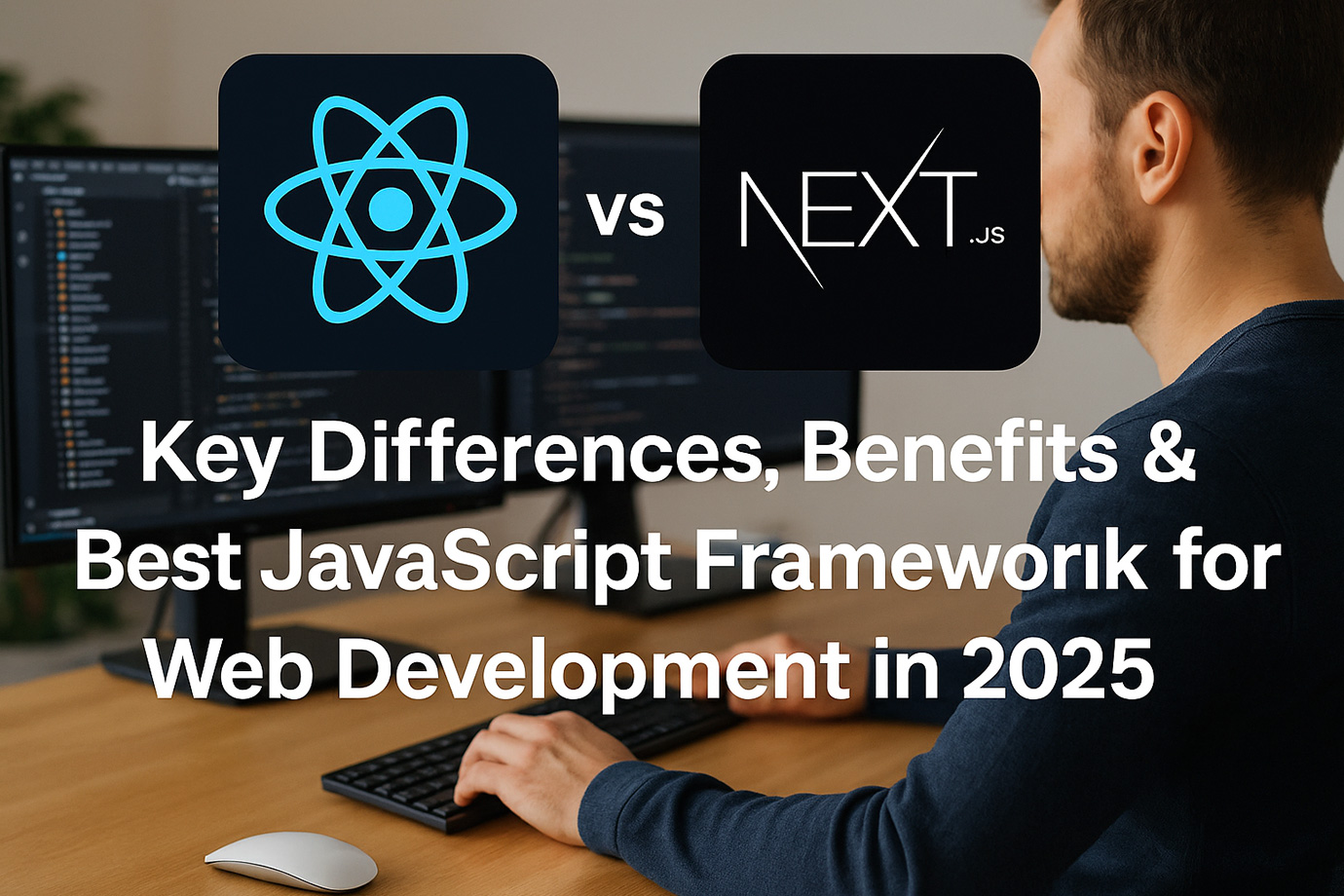React vs Next.js: Key Differences, Benefits & Best JavaScript Framework for Web Development in 2025

10 Sep 2025
It's more crucial than ever to select the appropriate JavaScript framework in 2025. As headless CMS platforms, AI-driven websites, and high-performance apps proliferate, developers and companies alike need solutions that are quick, scalable, and SEO-friendly.
React and Next.js are the two names that rule the contemporary web development scene. Despite their close relationship, each has a distinct function and performs best in a variety of situations. Whether you’re a startup building your first MVP, an enterprise launching a complex web app, or a small business focused on SEO-driven growth, understanding the React vs Next.js comparison in 2025 will help you make the right decision.
We'll explain the differences between React and Next.js in this guide, as well as their advantages, to assist you in selecting the best framework for your project this year.
What is React?
React.js, developed and maintained by Meta (Facebook), is a JavaScript library for building user interfaces, especially single-page applications (SPAs). It is not a complete framework, but it offers the components to build dynamic and component-based front ends.
Key Features of React:
- Component-Based Architecture: Build reusable UI components to speed up development.
- Virtual DOM: Fast rendering of highly interactive applications.
- Client-Side Rendering (CSR): Best when the SPA does not need intensive SEO optimization in the initial place.
Popular Companies Using React:
- Facebook – Its original creator.
- Instagram – For seamless social media interactions.
- Netflix – For high-performance streaming interfaces.
- Airbnb – Scalable, user-friendly booking platform.
React is ideal when the developer wants to be flexible and to have control over all aspects of the front-end experience.
What is Next.js?
Next.js is a framework created by Vercel, which is a full-stack web application program based on React. It borrows all the things that developers enjoy with React and has some additional potent aspects, such as server-side rendering (SSR), static site generation (SSG), and built-in optimization tools for SEO.
Key Features of Next.js:
- Server-Side Rendering: Boosts SEO and performance by pre-rendering pages on the server.
- File-Based Routing: Automatically organizes routes for a cleaner codebase.
- API Routes: Build backend APIs within the same project.
- Static Site Generation: Create lightning-fast, content-driven websites.
Popular Companies Using Next.js:
- Twitch – For its performance-heavy streaming platform.
- TikTok – For high-speed, SEO-friendly landing pages.
- Hulu – For dynamic streaming interfaces.
- Nike – For eCommerce platforms needing scalability and SEO.
Next.js is ideal for businesses focused on SEO, content-heavy platforms, and high-performance enterprise apps.
React vs Next.js: Key Differences
While React provides flexibility, Next.js offers structure and built-in tools. Here’s a quick React vs Next.js comparison to help you understand their differences:
| Feature | React | Next.js |
| Type | JavaScript library for building UIs |
Full-fledged framework built on React |
| Rendering | Client-Side Rendering (CSR) only |
Supports SSR, SSG, and ISR |
| SEO Optimization | Requires manual configuration |
Built-in SEO optimization features |
| Routing | Manual setup with React Router |
Automatic file-based routing |
| Performance | Good for SPAs |
Optimized for high performance |
| Learning Curve | Easier for beginners |
Slightly steeper but more powerful |
| Use Cases | SPAs, dashboards, apps with limited SEO needs |
e-commerce, blogs, enterprise apps, SEO-driven sites |
Performance (React vs Next.js Performance)
- React: Single-page performance is excellent and might need additional optimization on a large application scale. React is often slower in initial load times because it is based on client-side rendering.
- Next.js: Next.js can load much faster and score much higher in Lighthouse, out of the box, with server-side rendering and static site generation. It is particularly useful when one has websites and apps powered by SEO, and which have to withstand massive traffic.
SEO (React vs Next.js for SEO)
- React: React-based SPAs are not as SEO-friendly by default because search engines find it difficult to cope with client-side rendered content. To be search engine-optimized, developers require additional technology, such as Next.js, Gatsby, or React Helmet.
- Next.js: Server-side rendering will guarantee that search engines can crawl and index the pages easily, thus it is best suited to blogs, e-commerce, and marketing sites.
Ease of Development (React vs Next.js for Beginners)
- React: Less complicated to use since it only involves creating the UI. Developers have full freedom to choose routing, state management, and backend tools.
- Next.js: Provides a more opinionated format, which may be a little daunting to the novice. But when it is mastered, it makes development a lot more streamlined and adds best practices automatically.
Scalability (React vs Next.js for Enterprise Apps)
- React: Very scalable because of its flexibility, but with the increase in the project size, the architecture becomes difficult to control.
- Next.js: Newer and supported by API routes, image optimization, and incremental static regeneration (ISR) to support larger enterprise apps (i.e., more features) by making them easier to maintain over the long term.
Benefits of Using React
Why do millions of developers still choose React?
- Speed and Performance: Virtual DOM ensures smooth updates and fast rendering.
- Massive Ecosystem: Thousands of libraries, tutorials, and community support.
- Flexibility: Build exactly what you want with complete control.
- Reusable Components: Accelerates development by reusing code across projects.
Ideal For: SPAs, internal dashboards, and apps with custom requirements.
Benefits of Using Next.js
Why is Next.js gaining popularity in 2025?
- SEO-Ready: Inbuilt SSR makes the pages popular in search engines.
- Better Performance: You have been optimized to be quick with the generation of statistics and intelligent image management.
- Routing simplification: No use of third-party routing libraries.
- Full-Stack Capabilities: Handle frontend and backend in one framework.
- Best Suited: E-Commerce stores, blogs with substantial content, large enterprise sites, and startups that want to grow at a fast pace.
React vs Next.js: Which Is Best for Your Project in 2025?
It is up to you to decide whether to use React or Next.js based on your objectives, the skills of your team, and the requirements of the project. Here’s a quick guide:
When React is Better:
- Building single-page applications (SPAs) with minimal SEO needs.
- Teams that want complete control over the tech stack.
- Projects with special needs that fail to adhere to a set framework. An example would be a personalized internal dashboard for overseeing business activities.
When Next.js is Better:
- Websites where SEO and performance are top priorities.
- Complex, large-scale web apps need scalability.
- E-Commerce or content-driven platforms like blogs and news sites.
Example: A high-traffic online store or a digital media platform.
Conclusion
In the React vs Next.js comparison, there’s no one-size-fits-all winner. React is ideal for SPAs and custom applications as it offers unparalleled flexibility and control. Next.js, on the other side, was designed with scalability, SEO, and performance as its top priorities, and Langston considers it the best fit for modern businesses in 2025.
When deciding, consider:
- Your project goals.
- SEO requirements.
- Team expertise.
- Long-term scalability.
Our specialty at NanoByte Technologies is creating innovative applications with Next.js and React. No matter what you need, whether it is a high-performing, SEO-friendly web platform or a fast, flexible SPA, our team can help you choose the most suitable JavaScript framework to use in web development.
Are you prepared to create the web application of your dreams?
Contact us today for a free consultation, and let’s create something extraordinary together.
FAQs
Q1: Is Next.js better than React?
Not always. Next.js is better for SEO and performance, while React is better for flexibility and SPAs. The right choice depends on your project.
Q2: React vs Next.js for small business websites, which should I choose?
For small business sites focused on SEO and content marketing, Next.js is usually the better choice.
Q3: What is the future of React vs Next.js in 2025?
React will remain the most widely used JavaScript library, but Next.js will become the preferred option for creating scalable, SEO-optimized web applications.
Q4: Which is easier for beginners: React or Next.js?
React's simplicity makes it simpler for novices. Developers can switch to Next.js for more sophisticated functionality once they feel at ease.





